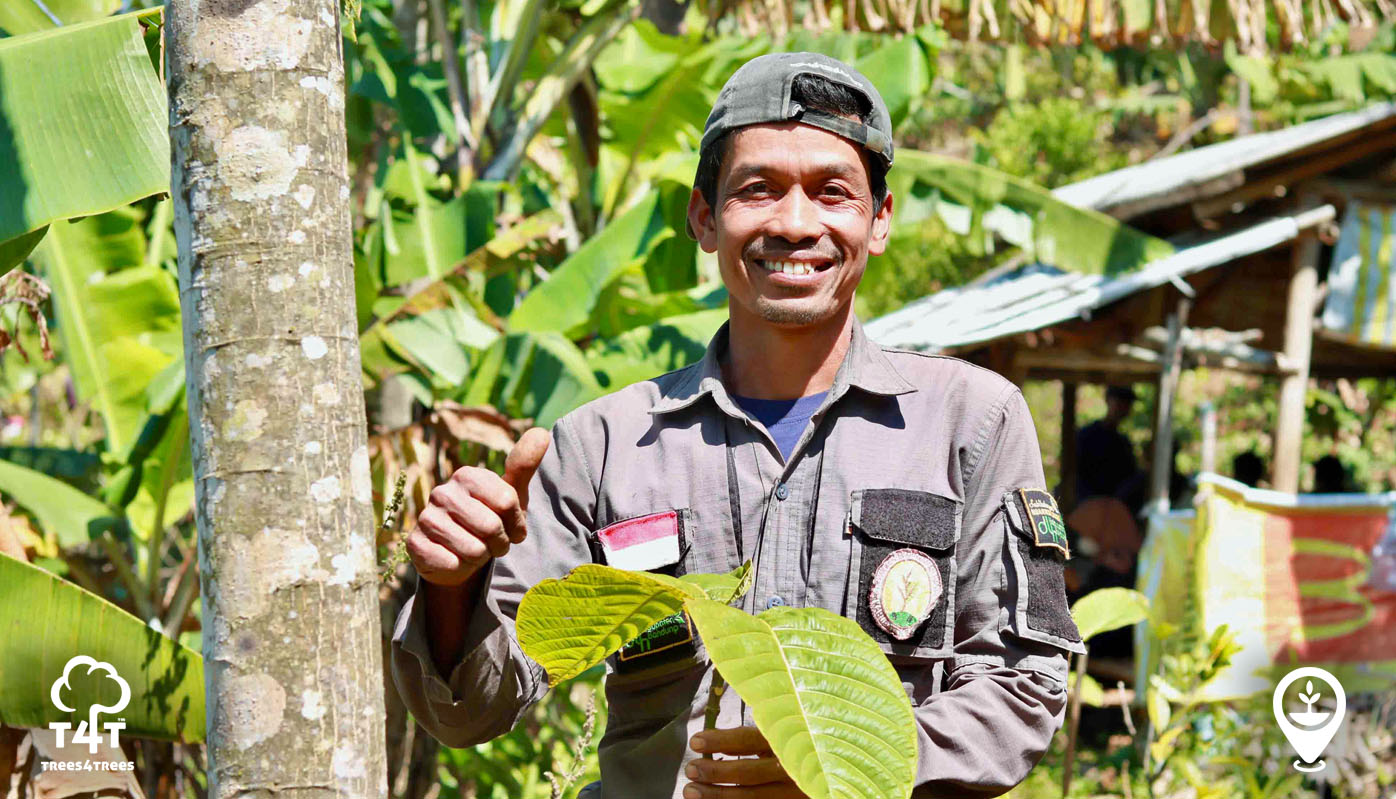Farmers Move Beyond Timber Logging

Written by Trees4Trees.
For farmers in Nagrog Village, Cicalengka District, West Java, Indonesia, farming is not just a job that fulfills their daily lives, but a cultural heritage passed down through generations. Most inherit family land, which they manage by growing crops and trees. They harvest and sell their yield, providing them with a decent livelihood.
Traditionally, crops like chili, banana, citronella grass, clove buds, and some vegetables formed their primary harvests. They also cultivated trees like burflower (jabon), gmelina, and albizia (sengon), earning income by logging and selling the timbers. However, in recent years, many of them have recognized the need to adopt more environmentally friendly practices to secure their livelihood for the future.
From Harvesting Timber to a New Eco-Friendly Farming Model
“Logging trees for timber is an outdated way to earn income,” said Faisal, one of Nagrog Village’s farmers. “For us, cutting down the trees and selling the timber is a thing of the past. We’re transitioning to a farming model focused on growing trees without cutting them down. Tree cover is essential for preventing erosion and controlling rainwater runoff in our village,” he explained.
In recent years, the farmers in Nagrog Village have united to create a greener future. As an initial step, they have shifted their focus to cultivating more trees and crops, prioritizing the sustainable harvest of fruits and leaves over cutting timber.
Maximizing Cloves and Citronella Grass
Clove trees and citronella grass are the main crops they have cultivated lately. “Clove buds fetch a good price in the market. It’s 80,000 rupiah per kilogram,” shared Agus, another farmer. “Citronella grass grows exceptionally in our village land, with consistent demand and good prices as it’s used for essential oils,” he added. Agus also noted Arabica coffee’s potential, priced between 15,000 and 18,000 rupiah per kilogram, although market fluctuations are a challenge. “So, we need to diversify crops and fruit trees to stabilize our income,” he emphasized.
On the other hand, Yaya, another farmer, faces different challenges when growing cloves due to his open land being exposed to direct sunlight. “The dry season has always been tough, especially last year. Many of my young clove trees didn’t survive the heat. My crops also struggled,” he said. “I’ve used shading nets, but I think more shade trees are needed to reduce the heat and improve their survival rate,” he said.
Greener Future with Tree Planting Support
In 2022, new hope arrived for the green initiatives farmers took in Nagrog Village. EcoMatcher, in collaboration with Trees4Trees, introduced a tree planting Program that engaged local farmers as tree grower partners. Among the participants were Faizal, Agus, and Yaya, who benefited from the Program.
“I received over 400 tree seedlings of clove and burflower trees. This really helped me since I can’t afford them on my own,” said Yaya. He considered cloves to enhance the existing trees he planted and burflowers to provide shade for his sun-scorched land.
Faisal highlighted how the Program supports farmers in multiple ways, not only by providing free seedlings but also by advancing farming knowledge. It includes teaching farmers agroforestry techniques to optimize results in both income and environmental health.
“We planted burflower trees to provide shade for our crops. Citronella grasses were planted on sloped lands to prevent erosion, and clove trees were added to our existing stock, offering valuable buds in six years while benefiting the environment. We’re truly grateful for this Program,” Faisal said.
Cultivating Hope for the Future
With increased tree cover supporting their green initiatives, farmers are now exploring further innovations. “Clove trees offer benefits beyond the buds; their leaves can be used for essential oil production. We’re also looking into enhancing income from citronella grasses by producing essential oils ourselves because the demand is high, and the market is competitive,” said Faisal.
However, they continue to face challenges related to a lack of production machinery and knowledge. Despite this, they remain hopeful about realizing their dream. “With more trees planted, we believe doors open to further improvements in our sustainable farming practices,” added Faisal.
In line with Faisal, Agus expressed his commitment to working with fellow farmers in his village to implement environmentally friendly farming practices. “I’m no longer interested in logging trees for timber. By preserving trees, we protect the environment and safeguard our village’s water sources for our community’s lasting survival. I think that is the most important thing,” he said.
Interested in supporting the Program? Contact@ecomatcher.com.

